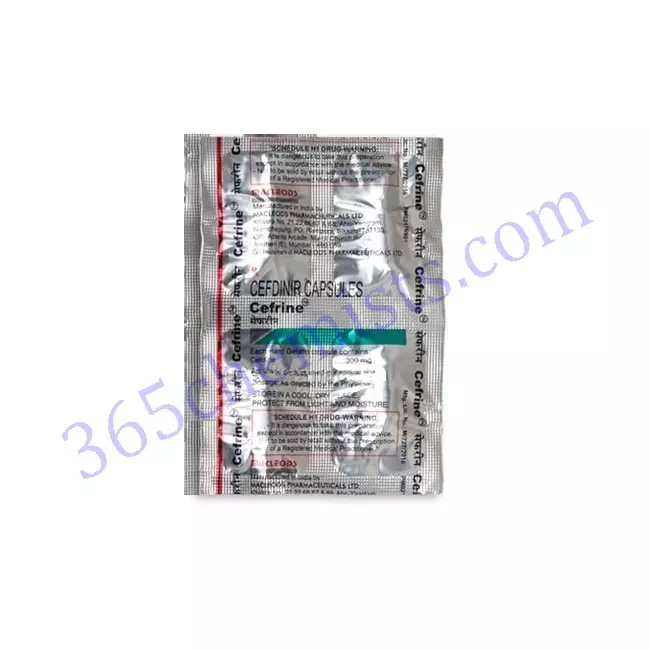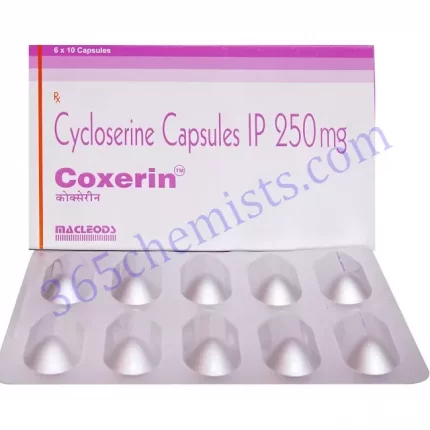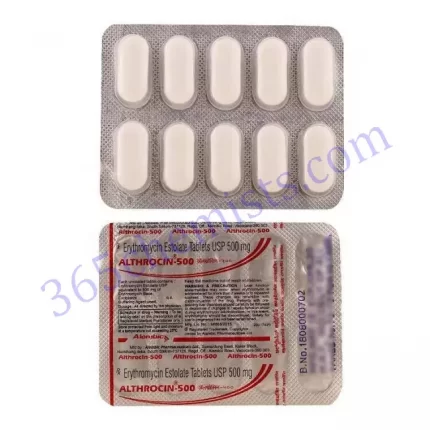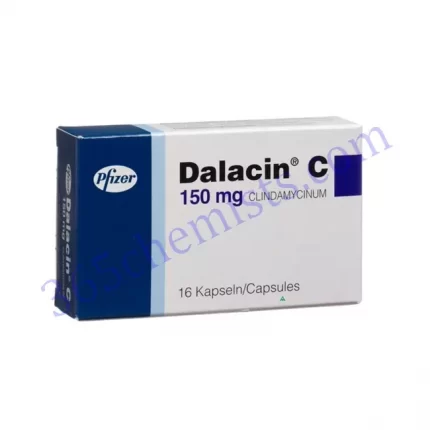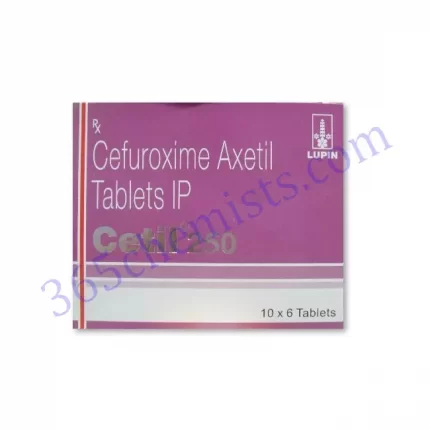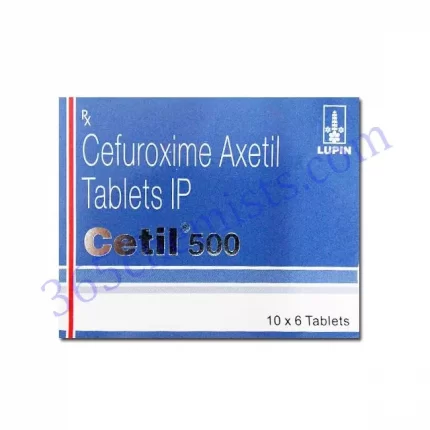What is Cefrine Capsule (Cefdinir 300mg)?
Cefrine Capsule is a prescription medication that uses cefdinir as its primary active component. Both adults and children can receive treatment with it because it is effective against bacterial infections. This detailed guide offers information on the applications, dosage, potential adverse effects, and preventative measures that should be taken before using Cefrine Capsule.
Cefrine Capsule is an antibiotic that can be taken by mouth and is categorised as a member of the cephalosporins drug family. Cefdinir is effective because it works by preventing the growth of bacteria, which in turn helps to get rid of the infection. You can get it in pill form, which is called a capsule.
Uses of Cefrine Capsule (Cefdinir 300mg)
Cefrine Capsule is most commonly employed for the purpose of treating a wide variety of bacterial infections that are brought on by susceptible strains of bacteria. Infections of the respiratory tract, such as acute bronchitis and community-acquired pneumonia, are frequent candidates for treatment with this medication. Additionally, it is an effective treatment for infections of the skin and soft tissues, sinusitis, and a number of sexually transmitted infections.
Dosage of Cefrine Capsule (Cefdinir 300mg)
It is possible for the recommended dosage of Cefrine Capsule to change depending not only on the nature and extent of the infection, but also on the patient’s age, weight, and general state of health. It is essential to adhere to your healthcare provider’s instructions regarding the dosage and length of treatment that have been prescribed for you. It is permissible to take the capsules either with or without food, and they should be swallowed whole with water. It is strongly advised that the full course of treatment be carried out, even in the event that the signs and symptoms show signs of improvement before the completion of the prescribed duration.
Common Side Effects of Cefrine Capsule (Cefdinir 300mg)
Cefrine Capsule has the potential to cause side effects, just like any other medication. The symptoms of gastrointestinal distress, which can include nausea, vomiting, diarrhoea, and abdominal pain, are typical of the adverse effects. These adverse effects are typically mild and fleeting in nature. It is essential that you make an appointment with your physician if any of these adverse effects continue or become worse.
Some people may experience severe allergic reactions, which can manifest as a rash, itching, swelling, dizziness, and difficulty breathing. These side effects are uncommon but serious. In the event that you experience any of these symptoms, you should seek medical attention right away.
Precautions and Warnings
Before you take Cefrine Capsule, it is essential that you discuss any allergies you may have with your doctor. This is especially important if your allergy is to cephalosporins or any other antibiotic. It is also extremely important that you disclose your medical history, including any problems with your kidneys or liver, because your dosage may need to be adjusted.
Because it has the potential to cause or exacerbate diarrhoea, Cefrine Capsule should be used with extreme caution in patients who have a history of gastrointestinal diseases. Notify your healthcare provider as soon as possible if you develop diarrhoea that is severe or continues after the treatment has ended.
Drug Interactions
There is a possibility that Cefrine Capsule could interact with other medications, which could reduce its efficacy or raise the risk of unwanted side effects. Talk to your primary care physician about any and all medications, herbal supplements, and vitamin regimens you are presently following. This includes medications that can be purchased without a doctor’s prescription as well as any other kind of medication, whether prescribed or not.
Additional Information about Cefrine Capsule (Cefdinir 300mg)
Cefrine Capsule is an antibiotic with a broad spectrum of activity, meaning that it is effective against a variety of bacterial infections. It accomplishes this by interfering with the synthesis of bacterial cell walls, which, in turn, leads to the inhibition of bacterial growth and, eventually, the death of the bacteria.
It is essential to keep in mind that the Cefrine Capsule is only effective against bacterial infections and does not treat viral infections like the common cold or the flu. This information is very important. As a result, it should never be utilised outside of the confines of a medical professional’s prescription and only for the treatment of the particular type of bacterial infection for which it was designed.
In order to keep a steady level of the medication in the body, it is recommended that the Cefrine Capsule be taken at regular intervals that are evenly spaced apart. It is possible that the effectiveness of the medication will decrease and that the risk of developing resistance to the antibiotic will increase if doses are skipped or if treatment is stopped too soon.
Cefrine Capsule is generally well tolerated; however, there are a few precautions and things to think about that should be kept in mind before using it. It is imperative that you discuss any ongoing medical conditions with your primary care physician, particularly if you have a family history of allergies, kidney or liver conditions, or gastrointestinal diseases. Your doctor will be able to determine the appropriate dosage for you and monitor your response to the medication with the help of this information.
It is imperative that you have a conversation with your healthcare provider about the potential risks and benefits of using Cefrine Capsule if you are pregnant, have plans to become pregnant in the near future, or are breastfeeding. They are going to examine the circumstances and come to an educated conclusion about whether or not the medication should be taken while breastfeeding or during pregnancy.
It is essential to keep a close eye out for any signs of an allergic reaction while you are undergoing treatment with Cefrine Capsule. Some of these signs include a rash, itching, swelling, and difficulty breathing. In the event that you experience any of these symptoms, you should seek medical attention right away.
It is essential to finish the full course of treatment with Cefrine Capsule, even if you begin to feel better before the recommended amount of time has passed. If you stop taking the medication too soon, you run the risk of not completely eliminating the bacteria, which could result in a return of the infection or the development of strains of bacteria that are resistant to antibiotics.
It is imperative that you seek immediate medical attention in the event of an overdose or the accidental ingestion of a higher dosage than intended. There is a possibility that an overdose will result in severe gastrointestinal symptoms as well as effects on the nervous system.
It is imperative that the Cefrine Capsule be stored in accordance with the instructions that have been provided by the manufacturer. It is recommended that the capsules be kept at room temperature, away from moisture and direct sunlight, and out of the reach of direct sunlight. Make sure that both children and animals can’t get their hands on the medication.
Conclusion
Antibiotic medications like Cefrine Capsule (Cefdinir 300mg) are available only with a doctor’s prescription and are used to treat bacterial infections. It is essential to take the medication exactly as directed and to finish the entire allotted amount of time for treatment. Consult a healthcare professional if you have any questions or concerns, or if you experience any unwanted side effects. It is imperative that you tell your doctor about any preexisting conditions or allergies you have in order to guarantee that the medication you are taking is both safe and effective.

